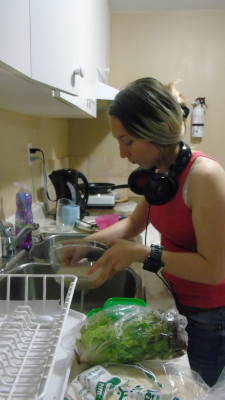Students plus healthy eating equals better nutrition
STORY BY KELSEY LYONS
Friends, relationships, 8 a.m. classes and – oh right, then there’s food.
It’s your first year and there are already so many things on your mind that – believe it or not – you might forget that eating properly will reduce stress and help the year go smoothly.
Nutrition and health coach Michelle Meilleur at livingwell, a nutrition and wellness coaching business in Belleville, says students are often gaining weight as well in college or university – and not just because of the stress of school work.
“They have changed their routine and diet drastically,” she said. “Even though it may not be too bad, it’s just a lot of takeout and prepared food.”
The transition from being at home with home-cooked meals almost every night and then being left to fend for yourself can be difficult for some students.
Meilleur says that over the last few years, more parents have been investing in nutritional coaching before sending their kids off to school.
“Nutrition has always been important but people are thinking about it more and more,” said Meilleur. “So if you learn good examples at home and if you get the right information, you have a better chance at staying healthy while in school.“
Meilleur says students should be planning their meals and using cookbooks.
“If (students) actually look for cookbooks that are geared to them, it’ll be easier for them because the recipes won’t have that many ingredients and they’ll be cheap,” she said. “So look for those types of books as opposed to fancy cookbooks.”
Nutrition student at Saint Francis Xavier University Mikaela Henderson says the transition for some students can be difficult and not just because of the change in diet.
“For a lot of students, they’re moving fairly far away from home, sometimes even a few provinces over,” said Henderson. “So coming to a new environment, it’s a new experience and you have lots of new stuff to tackle.”
Students are so busy they don’t usually think about what they’re eating; they’re just aware that they’re eating something, which is all that matters to them.
“Definitely healthy food is one thing that can be easily ignored or forgotten, because there’s so many options out there,” said Henderson. “So if you don’t want to cook a meal, you can just grab something quick.”
The problem isn’t just with the lack of healthy food options around.
“We live in a society where prepping food is just becoming very overwhelming,” said Henderson.
Students have so much to worry about that thinking about their meals is not a priority.
“There are so many stresses, like are you going to do well in class or you’re focusing on making new friends,” said Henderson.
And often students are stressed because they aren’t eating as healthy as they should be.
“As a society we need to bring the focus back on making healthy home-cooked meals,” said Henderson. “And sometimes it’s more comforting for new students to have a home-cooked meal over a piece of pizza.”
Cooking isn’t rocket science, it really just requires some thought and planning.
First-year 2D Design student Marissa Naylor, 18, is living in residence at Sheridan for her second year and she is still struggling to eat healthy.
“I try not to go for the ‘junkie’ stuff, but I did eat some because I found I was on a tight schedule,” said Naylor.
Naylor says she doesn’t really think about meals or plan ahead.
“Maybe like 10 minutes a day. I don’t put a lot of effort into it,” she said. “It’s bad I know, but it works.”
Planning a meal can be as simple as preparing a list of ingredients and going to the grocery store.
“I go to the grocery store all the time and to be honest I just grab what’s convenient, which would be frozen dinners the majority of the time,” said Naylor. “I like anything that’s faster to eat, because well I’m lazy.”
Some students are not only intimidated by the effort that needs to be put in when cooking but also they aren’t sure of what to buy to make a meal.
First-year Animation student Uriya Jan, 18 usually goes grocery shopping once a week.
“I just buy whatever I think I need, I don’t usually plan,” she said. “I just use whatever is in my refrigerator.”
Jan says that it takes her between one and two-and-a-half hours to cook her meals.
“Sometimes it even takes less time than that, it can be five minutes,” she said. “But I know it will last me a couple meals.”
Nutrition coach Meilleur suggests that students get together and figure out common meal plans with friends.
“And this can be very inexpensive and you’ll feel better at the end of the week,” she said.
Meilleur says students tend to eat healthier when they have the appropriate amount of exercise as well.
“Eighty per cent of your results will come from your food, so it’s high and that’s why there should be more emphasis on food,” she said. “But the rest is getting the appropriate amount of exercise that your schedule allows.”





